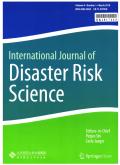Transnational Dialogues on Interdisciplinary Approaches for Advancing People-Centered Warning Systems
IF 4
2区 地球科学
Q2 GEOSCIENCES, MULTIDISCIPLINARY
引用次数: 0
Abstract
Abstract The United Nations Office for Disaster Risk Reduction and the World Meteorological Organization launched in 2022 the executive plan of the world program “Early Warning Systems for All” to be implemented from 2023 to 2027. This program champions an investment of USD 3.1 billion into the four pillars of warning systems and calls for multi-hazard and people-centered warning systems (PCWS). However, there is a scientific gap concerning interdisciplinary approaches to promoting them. Motivated by the call for action of “Early Warning Systems for All” and warning research gaps on the lack of interdisciplinarity, a workshop series “Interdisciplinary Approaches for Advancing People-Centered Warning Systems” was held in early 2023. This short article shares the preliminary findings and recommendations of this research, which involved a transnational virtual dialogue between one scientific organization in Brazil and one from the United States. The findings and recommendations discussed in three virtual sessions and one collective working paper were centered on three aspects: promoting interdisciplinary integration in research; the need to discuss the characteristics of a PCWS; and promoting problem- and solution-based programs with people to integrate them at all phases of the warning system.推进以人为本的预警系统的跨学科方法跨国对话
联合国减少灾害风险办公室和世界气象组织于2022年启动了“全民预警系统”世界计划的执行计划,该计划将于2023年至2027年实施。该计划支持向四大预警系统支柱投资31亿美元,并呼吁建立多灾种和以人为本的预警系统。然而,在跨学科的方法来促进它们方面存在科学差距。在“人人享有预警系统”行动呼吁的推动下,并就缺乏跨学科的研究差距提出警告,2023年初举办了“跨学科方法促进以人为本的预警系统”系列讲习班。这篇短文分享了这项研究的初步发现和建议,其中涉及巴西的一个科学组织和美国的一个科学组织之间的跨国虚拟对话。在三次虚拟会议和一份集体工作文件中讨论的结果和建议集中在三个方面:促进跨学科研究的整合;是否有需要讨论PCWS的特点;并推动以问题和解决方案为基础的项目,将他们整合到预警系统的各个阶段。
本文章由计算机程序翻译,如有差异,请以英文原文为准。
求助全文
约1分钟内获得全文
求助全文
来源期刊

International Journal of Disaster Risk Science
GEOSCIENCES, MULTIDISCIPLINARYMETEOROLOGY-METEOROLOGY & ATMOSPHERIC SCIENCES
CiteScore
6.50
自引率
7.50%
发文量
63
审稿时长
13 weeks
期刊介绍:
The International Journal of Disaster Risk Science (IJDRS) provides a pioneering platform for researchers and practitioners aiming at greater resilience and integrated risk governance in view of local, regional, and global disasters. IJDRS breaks new ground in research about disaster risks by connecting in-depth studies of actual disasters and of specific practices of disaster risk management with investigations of the global dynamics of disaster risks and theories and models relevant for advanced integrated risk governance.
 求助内容:
求助内容: 应助结果提醒方式:
应助结果提醒方式:


